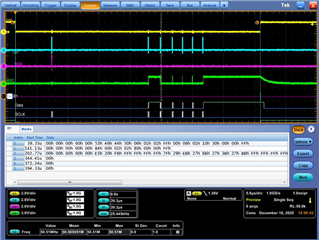Hi,
We are currently working on an home-made board using 66AK2H14 SoC. Everything works fine until now. We are using U-boot and Linux that we featured for our board.
Our base was what is provided in ti-processor-sdk-linux-k2hk-evm-05.00.00.15.
Until now, we focused on making everything working to meet our needs in terms of functionality.
However, it is now the time to work on optimisation and particularly on the boot time.
What we saw for already 2 years is that we have very poor SPI NOR flash read/write performances.
What we observed in Linux (looks to be the same in U-boot):
Read: 610kB/s
Write:420kB/s
On a baremetal test done by our hardware team, it has been observed a reading speed of around 5,2MB/s while we have a theorical value around 6MB/s. It is closer to what we expect.
We also compared a READ_ID command treated in baremetal and in U-boot. While in baremetal, it takes 2 us to send the command READ_ID and read the 6 first bytes (time between the reading of a byte = 33ns), in U-boot, it takes 39us ( there is some big timing between the reading of 2 successive bytes => about microseconds or ten us).
You can see it on the blue curve below.

The reading speed particularly impacts our boot time. We really need to fix that.
Do you have any idea about this?
Some more information:
We already played with delay register (wdelay). It doesn't change anything and it is currently fixed to 0.
Our SPI frequency is 50 MHz.
Thank you in advance for your help.
Best regards,
K.Luong

